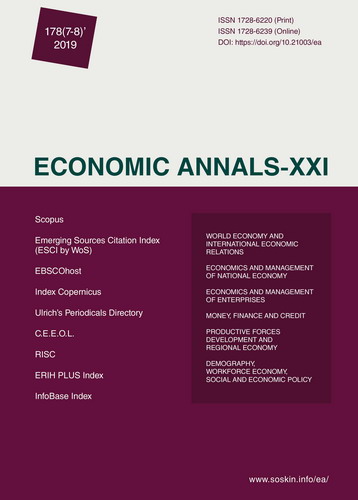Urban passenger water transport: operating within public-private partnership (international research and case study)
Urban passenger water transport: operating within public-private partnership (international research and case study)
Author(s): Viktoriia Budnyk, Kateryna LernichenkoSubject(s): Business Economy / Management, Rural and urban sociology, Transport / Logistics
Published by: Institute of Society Transformation
Keywords: Concession Agreement; Service Contract; City Passenger Water Transport; Public-Private Partnership (PPP); River Infrastructure; City Logistics; Demand Forecasting Mechanism;
Summary/Abstract: Introduction. There are no examples of public-private partnership (PPP) projects realization in the field of transport infrastructure development in Ukraine, as compared to the successful experience of advanced economies. Further research is needed to solve the problems of forming an effective PPP implementation mechanism, justifying the relationship between public and private partners in the process of partnership projects realization, taking into account the specific areas of PPP application, including the system of urban passenger water transport.The purpose of the research is to create a mechanism for cooperation of urban passenger water transport (UPWT) operators with local authorities on the basis of public-private partnership in order to improve the system of urban public passenger transport.Results. The developed mechanism of functioning of public passenger water transport enterprises on the basis of PPP should include the following tools: competitive selection of a private partner who will engage in business activities in the field of local passenger water transport services by such forms of public-private partnership agreements as concession agreements for the development of coastal infrastructure and contracts for the provision of passenger transport services; a methodical approach to assessing the potential demand for services of UPWT operators by interviewing potential consumers of transportation services; a methodical approach to mutually agreed terms of PPP agreements on the basis of evaluating the effectiveness of partnership from the standpoint of private and public parties of the agreements; algorithm of fare system formation for the services of UPWT enterprises; immediate concession agreements and contracts for transportation services.The developed mechanism has been piloted in the field of urban passenger water transportation in Kyiv capital city which is rich with river infrastructure in two directions of transportation: shuttle transportation (as an example is the route «Domania Bay - Pivnichnyi («Northern») Bridge - Rusanivska Embankment - Dnipro metro station - Postal Square», the length is 19.50 km) and chartered transportation. It was proposed to enter into a concession agreement of the shore base constituent with the local authorities, which consists in the purchase of a pontoon and the arrangement of the coastal zone (including waiting places for passengers) in order to equip the waterfront. The calculations showed that the use of the proposed mechanism would provide private operators with a margin of 16-21%, local budgets will receive additional revenues in the form of concession fees, and in general it would also achieve social effect due to the development of urban passenger water transport and transparency of relations between private operators of UPWT and local authorities.Conclusion. Development projects for urban passenger water transport should be implemented on the basis of mutually beneficial cooperation between private operators and local authorities through concession agreements on the maintenance and expansion of coastal infrastructure and contracts on the passenger transport services.
Journal: Економічний часопис - ХХІ
- Issue Year: 178/2019
- Issue No: 7-8
- Page Range: 84-95
- Page Count: 12
- Language: English

